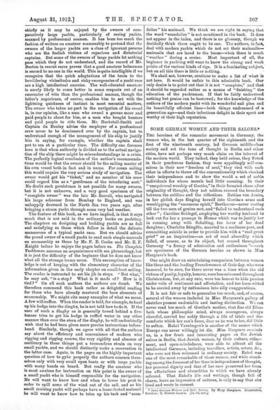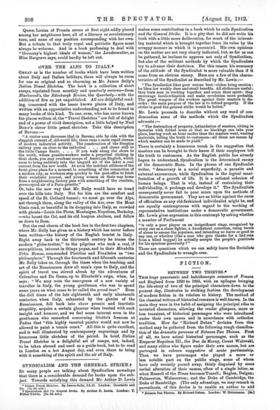SOME GERMAN WOMEN AND THEIR SALONS.*
THE heroines of the romantic movement in Germany, the women who, in the last quarter of the eighteenth and the first of the nineteenth century, led German middle-class' society and set the toile of thought in Berlin and other cities, have not perhaps very much claim on the interest of the modern world. They talked, they held salons, they flirted in their ponderous fashion, they were appallingly self-con- scious in their new "freedom of soul," they vied with each other in efforts to throw off the conventionality which checked their independence and to show the world a set of noble individuals for whom morals had little meaning. In their "unequivocal worship of Goethe," in their frenzied chase after originality of thought, they not seldom crossed the boundary between the sublime and the ridiculous. Bettina von Arnim, in her girlish days flinging herself into Goethe's arms and worshipping the "enormous spirit," Beethoven—never resting till the two men of genius met, and "failed to understand each other " ; Caroline Schlegel, employing her worthy husband to look out for her a passage in Homer which was to justify her in running away with Sohelling, the lover of her dead daughter; Charlotte Stieglitz, married to a mediocre poet, and committing suicide in order to provide him with a "real great grief" as an inspiration—an act of mad absurdity which failed, of course, as to its object, but roused throughout Germany "a frenzy of admiration and enthusiasm "—such are specimens of the German heroine as shown in Miss Hargrave's book.
One might draw an entertaining comparison between women like these and the leading Frenchwomen of their day, who were immoral, to be sure, for there never was a time when the old virtues of purity, loyalty, honour, were less esteemed throughout Christendom, but, at any rate, were too honest to hide passion under veils of sentiment and affectation, and too keen-witted to be carried away by enthusiasm into silly exaggerations.
It is not fair or safe to generalize too much, and, of course, several of the women included in Miss Hargrave's gallery of sketches possess undeniable and lasting distinction. We can never read too much of Goethe's mother, that fine old Eliza- beth whose philosophic mind, always courageous, always cheerful, carried her nobly through a life of trials and dis- comforts which her son's fame, dear as he was to her, did little to soften. Rahel Varnhagen's is another of the names which Europe can never willingly let die. Miss Hargrave reminds us, in a few fresh and interesting pages on the Jewish
salons in Berlin, that Jewish women, by their culture, refine-
ment, and open-mindedness, were able to attract all the intellectual Germans, including travellers, artists, actors, Jac., who were not then welcomed in ordinary society. Babel was one of the most remarkable of these women, and while stand- ing among the foremost of her time in independence of thought, her personal dignity and that of her race preserved her from the affectations and absurdities to which we have already referred. That Babel's life and writings, though full of charm, leave an impression of sadness, is only to say that she lived and wrote in earnest.
•• Some German Women and their Salons. By Mary Ilargrave. llinetrated,,
London: T. Werner Laurie. Gd. net.]
Queen Louisa of Prussia seems at first sight oddly placed among her neighbours here, all of a literary or revolutionary turn, and none of any position corresponding with her own. But a tribute to that truly royal and patriotic figure must always be welcome. And in a book professing to deal with " Germany's highest ideals of women," the Landesmutter, as Miss Hargrave says, could hardly be left out.



































 Previous page
Previous page